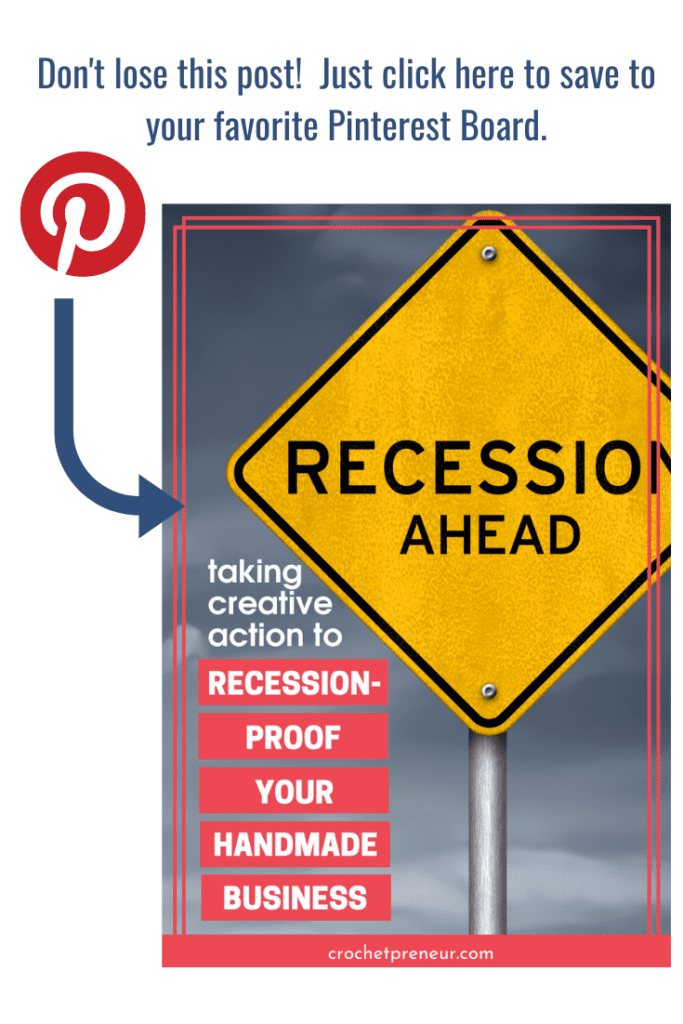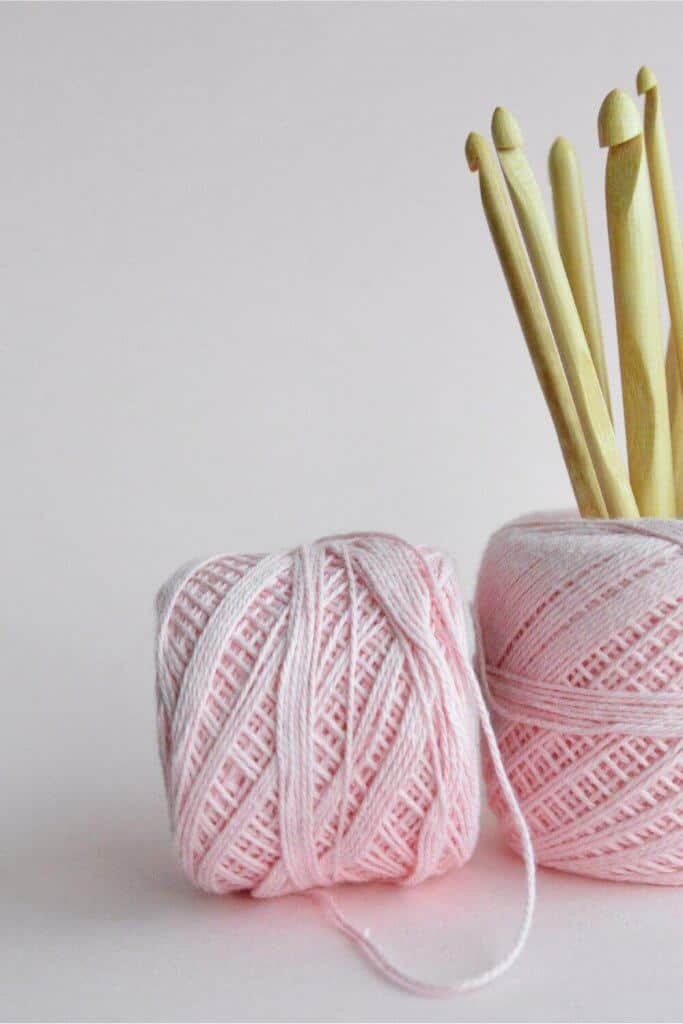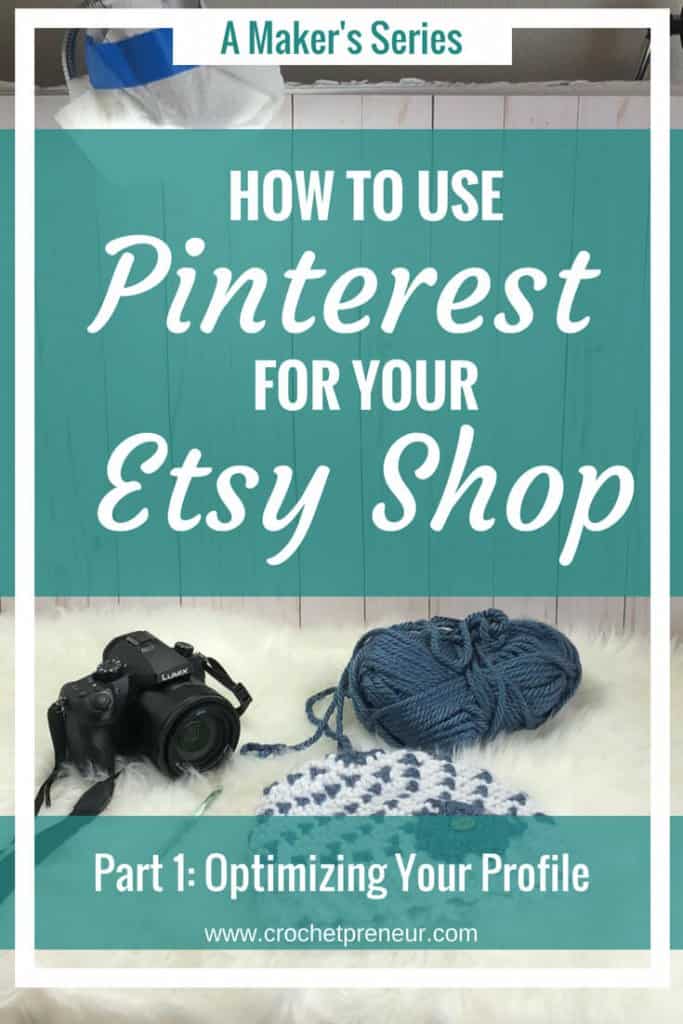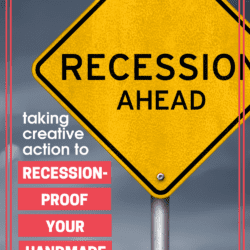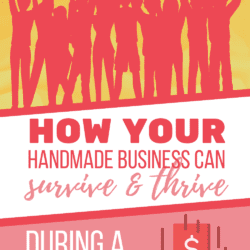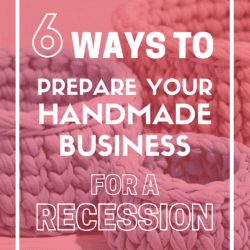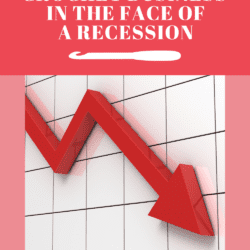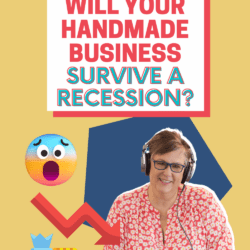News of a coming recession can leave crochet business owners feeling uncertain about the future. Recessions can hit small business owners especially hard. But taking creative action can position your handmade business to survive or even thrive during tough economic times. So what actions can you take? This week, I’m kicking off a six-week series that will explore how to recession-proof your business. So stay tuned!
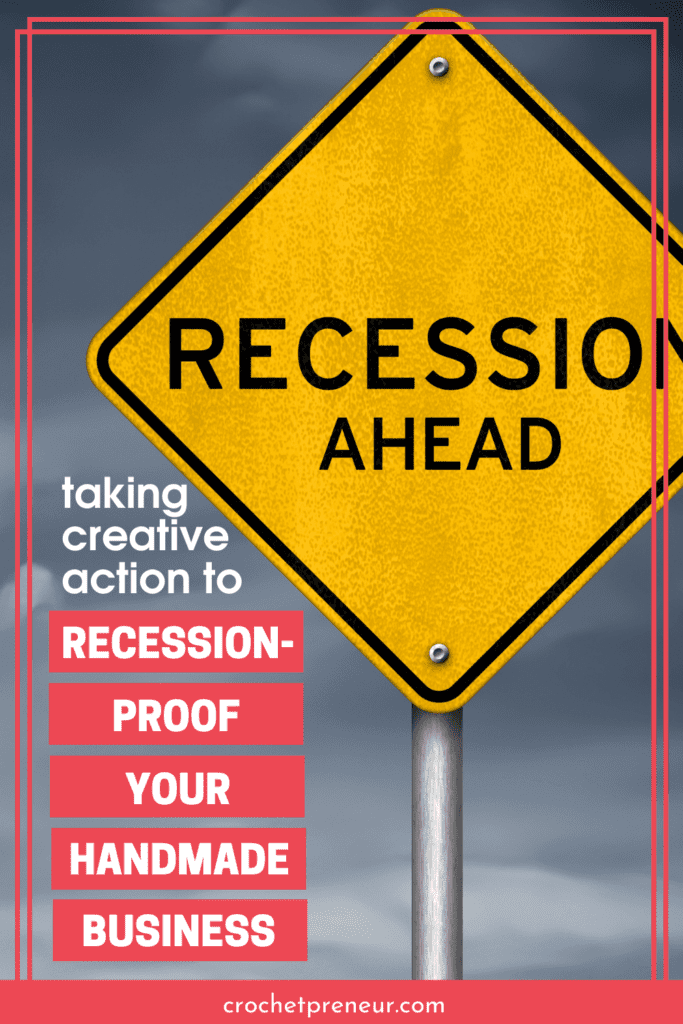
Will Your Handmade Business Survive a Recession?
[00:00:00] So handmade business owners, are you worried about a coming recession? It seems, after listening to some political analysts and such, that a recession is impending, is on its way. I am no prognosticator but it seems as if we are on the road to recession sooner rather than later. And so what I wanted to talk to you all about today is will your handmade business survive a recession? Is this something you’re even worried about? Have you thought about it? Have you considered it? Where do you stand with this?
Transcript: Recession, Handmade Business, and You: Will Your Crochet Business Survive…even Thrive?
[00:00:58] For me I have been thinking about it and making some plans. We are going to talk about how to survive and thrive with your handmade business, even in the face of a recession. So if you are a handmade business owner, a crochet business owner or designer, and you are interested in protecting yourself in the face of recession. I’m glad you’re here. Welcome.
[00:01:30] If you haven’t been here before, my name is Pam Grice. I’m the Crochetpreneur. I’m on a mission to help 100,000 women find financial freedom through crochet. Most of the tips I offer are great for knitters and other handmade sellers as well. So I want to welcome everyone and thank you for coming. Be sure to do all the things. Like this video so more people can find it here in the YouTube and Facebook algorithms. And be sure to subscribe and hit the notification bell so that you receive all of the notifications.
What is a Recession?
[00:02:11] All right. So recession. What does recession mean? Recession means … Technically it is two successive quarters of downward economic activity, so a decrease in the economic activity. And we are seeing that now, and we’re about to hit the second-quarter numbers for a decrease in economic activity. And so it appears that recession is on the horizon. Typically, recession means inflation, fewer people buying things that are not necessities. And it means reduced income for small businesses, typically. So we need to take a look at how we can protect ourselves from that.
[00:03:01] So I’m going to check out your comments real quick for those who are watching live. Let us know if this is something that has been on your radar. Have you been thinking about this? And if you’re watching on replay, same thing. Say #replay. Let us know. Is this something that you’ve been thinking about, preparing for, or is this kind of your first foray into thinking about recession and how you’re going to protect your business? Good morning, Kim and Kathy, Jamie, Crystal. Hi, everyone. Tuula’s here. It is good to see you. Some people say they’re already experiencing this downward trend.
What Kinds of Businesses Thrive in a Recession?
[00:03:46] Yes. Let’s take a look at … We have experienced a downward economic activity recently, right? I know 2020 is the year of which we shall not speak. However, I think that we can learn some things from 2020. In 2020, it was the innovators and the creative action takers whose businesses thrived. Many others, feeling disempowered, simply closed their doors. So there was a definite kind of line in the sand between those who survived and thrived and those who didn’t. And this is no shade to those who didn’t. I feel bad for them. I’m sorry that they lost their businesses. However, I think that we can learn some things from both of those groups of people.
[00:05:03] So those innovators and those action takers, I’m sure all of you have seen who those might be in your community. So specifically, I’m talking about those businesses in your community because this was a crisis for local small businesses, right? Because people couldn’t leave their homes. So this is brick-and-mortars–restaurants, those types of businesses–that were the most impacted from what I have seen.
Innovative Business Owners During COVID
[00:05:38] But it was those businesses who shifted, who said, “Okay. How do we shift our business in the face of the fact that people can’t come to our location? People can’t come here to sit in our restaurant. They can’t come to our shops to buy. What can we do instead?” So they made outdoor seating areas. One of my friends owns a brewery in town and they put up these adorable little glass greenhouse sitting areas with little picnic tables inside. And everybody had their own little greenhouse to sit in. So it was still … It was private. It was intimate. It was beautiful. They had beautiful outdoor lighting. And their business did really well.
[00:06:24] Another friend who owns a business, or a restaurant, they jumped on that curbside service right off the bat. And they did great. So they would just have people drive up. They would come out and deliver their food. And it did really well. And so those kinds of things, people taking their businesses outdoors. All kinds of things. Everyone got creative to figure out how they could still serve their customers, even though their customers couldn’t come through their doors.
Taking Action to Recession-Proof your Handmade Business
[00:06:59] What we can learn from them is not specifically those strategies because we’re facing something very different as handmade sellers. Some of us sell in person. Some of us sell online. Some of us sell services. Some of us sell products. Some of us sell digital products. So we are all in different camps. But we can look at these traits and say, “How can I be innovative? How can I be a creative action taker in order to then protect my business?”
[00:07:32] So if recession is on the horizon, which type of business owner will you be? Will you be innovative? Will you take action? Or will you step into victim mentality and disempowerment? The choice is up to you, thankfully. And if you choose to be an action taker, I want to walk you through some steps that will get you to where you want go.
6 Areas to Address When Preparing for a Recession
[00:07:15] So we’re going to talk about, just quickly, some areas of focus that those thriving businesses attended to and took care of in order to thrive during this time. And just to let you know, we’re going to deep-dive into each of these areas in future videos. So I’m going to start a series to recession-proof your handmade business. And the next–what is it?–six weeks, I’m going to be deep- diving into each of these areas. So this is just an overview. But I think it will help get your ideas churning, get your thoughts churning, so that when we do address it, you’ll be ready to take action. So those who thrived in 2020 attended to these six areas.
Crisis Money Management
[00:08:54] First is crisis money management. This is debt reduction. This is profit optimization. All of those things. So we’ll step through each of these processes that you need to take a look at in your business in order to manage your finances in a crisis.
Strategic Redirection
[00:09:14] Next is strategic redirection. So making bold moves. Saying, “Okay. I see what I need to do and I’m going to do it. So sometimes that may be shifting your target audience from people who are buying luxury items to people who are buying necessities, or people on a budget to people with discretionary income even in the face of recession. So taking a look at those details in your business and saying, “How can I redirect in order to protect my business?”
Offer Optimization
[00:09:54] Next, offer optimization. So this is saying, “How do I create offers for my customers that are both irresistible, that meet a need?” So no longer are people going to be spending lots of money on luxuries or want-tos. They’re going to be spending money on things that they need. They may still hold to their values of valuing handmade but it’s unlikely that they’re going to be buying things that don’t serve a purpose or serve multiple purposes.
[00:10:33] So taking a look at your offers, taking a look at your product line, and saying, “How can I adjust the things that I’m selling to make them more of a necessity and more of something that people are going to be willing to part with their money for during times of crisis?”
Task Prioritization
[00:10:53] Next is task prioritization. This is taking a look at the things that you’re doing and saying, “What’s a waste of my time? What is going to make me money? And what’s going to make me the most amount of money with the littlest effort?” So this is really streamlining your business, taking a look at systems, taking a look at the people on your payroll, if you have a payroll, and saying, “Is everyone operating at their optimum skill level? And is everyone in the right place in the business?”
Message Marketing
[00:11:30] Next is message marketing. So this is going to be less about product- based marketing. It’s going to be more about marketing with a message– marketing saying, “Hey, I see you. I understand what you need. And I have this thing that will solve that issue,” and really speaking to the heart of your customer, and being really conscientious and cognizant about how your message comes across.
Self Care and Support
[00:12:04] And finally, self care and support. So this is taking care of yourself in the midst of crisis so that you don’t crash, so that you don’t fall into hopelessness, despair, and again, disempowerment, because that’s going to be what takes your business down with it. So finding the support that you need throughout the process and also taking care of yourself.
[00:12:27] So one of our friends is Brother Luck from Top Chef. I don’t know if you know Brother Luck but he’s one of our friends from church and he has two restaurants here in town–three now. But at the time, he had two restaurants. And in the midst of 2020, he said, “Listen, we’re going to shut the business down for a couple of weeks because my staff needs rest. My staff is tired. I’m tired. We’re all really struggling. And so we’re going to shut the business down for a couple of weeks. We’re going to take care of ourselves. We’re going to reevaluate our menu. We’re going to reevaluate our processes. And then we’re going to come back and it’s going to be better than ever.”
[00:13:18] And that’s what they did. And his businesses did thrive throughout that time. And again, like I said, he’s got a new restaurant now. He continued to grow during that time because he took care of himself and he took care of his staff which was really important. And so doing that for yourself and anybody that you have on payroll is important as well.
New Series: Recession-Proof Your Handmade Business
[00:13:44] Like I said, each of these bases need to be covered if your business is going to survive and thrive. So we will be digging into each of these areas as we work through the coming series, Recession-Proof Your Handmade Business. If you’re ready to be empowered and you’re willing to take action to prepare for a possible recession rather than be a victim to it–look at me reading my script over here–be sure to subscribe.
Join my E-mail List!
[00:14:17] So subscribe to the channel. We just hit 5,000 subscribers. We’re on the road to even more. We’re on the road to more impact, helping more people, which you know is the goal. So be sure to subscribe. And if you want to get on the e-mail list and get notified of new videos, get notified of new offers and new help for your business, be sure to head over to Crochetpreneur.com. And you can sign up for our e-mail list right there.
[00:14:49] We are tracking. So in the beginning I said, “On a mission to help 100,000 women. And this is for men as well. My passion is for women because that’s my passion. So my mission is to help 100,000 women (and men) find financial freedom through crochet. And so the way we track that is our e-mail list. And soon I will have a tracker that you can all see what that number is at. Right now, we’re just over 35,000 and looking for that to grow.
[00:15:26] So if you’re not already on our e-mail list, get on the list. Be counted as one of those lives and businesses that we’ve impacted at Crochetpreneur. We’d love to have you. Plus you’ll get weekly encouragement, business tips. And you’ll be the first to get notified of events. And we do have another event coming up at the end of July, having to do with your product line. And I think it would be really helpful to take a look at that product line as we move into both recession and holiday season. So I think it will be really helpful for you to take a look at that. And next week, I’ll have a link for you to sign up for that, if you’re interested. That was a lot.
Community Discussion
[00:16:09] I would love to hear from you. What are your concerns? What are you worried about? And are you interested in joining us for this series? Again, this series is free. It’s all right here on YouTube. It will be throughout the next six weeks.
[00:16:30] Tuula says, “I’m very proud of my daughter who found many ways to pivot her organic cosmetics business and manage through COVID.” Good for her. Oh, that’s awesome. Carol says, “Pivot, pivot, pivot.” Yes. Kim says, “Our groceries in general and gas prices have doubled in Canada.” Yeah. We went grocery shopping last week, just to try and load up on a few things–not hoarding, not freaking out, but just loading up on a few things that we feel the prices are going to increase on–and they had already gone up. And gas prices, man. Yeah.
Recession: Talking About a Difficult Topic
[00:17:12] Bonnie said, “I’m so glad you’re talking about this. Not a lot of people are.” A lot of people are not looking at this issue. There’s a lot of things happening in our world right now. A lot of it is distraction. A lot of it is really impacting people’s lives. And this issue is just kind of happening in the background. But I think as business owners, we need to focus on what’s happening in the economy. So I’m happy to talk about it here. “This is a hard topic and you do it with grace.” Thanks. Thank you, Katie. Kim says she’s interested. Let’s see. Shelly says, “I think the series will be really helpful. Definitely wanting to join in this series. Where I live, everything is going up in Washington State. Yep.
Planning for an Inevitable Recession
[00:18:06] “Blog hops and bundles just aren’t working that I’m seeing for designs and so I need to completely pivot.” “These are great topics that will be important, whether you go through a recession or not.” That’s true. And the thing is that recession is inevitable. So from the research I’ve done, it says that, typically, recessions happen every six years and they may last two months, or they may last 18 months, or they may last longer.
[00:18:33] And being prepared for that, understanding that there are cycles in the economy that are predictable. It’s predictable that recession will happen at some point. So why not? Let’s have a plan. You can even have a little folder in your file that says “recession proof.” And you just pull out the folder when you’re worried about recession coming. So you can either build your business to be recession-proof always, or you can say, “Okay, these are the pivots I’m going to make when things start to turn.”
[00:19:11] “The number one thing on my mind as a new business owner is how can I grow a customer base when everyone is tightening their wallets?” Yes. And we’ll be talking about that. We’ll be talking about how to meet the needs of customers and really hone in on products that your customers need and want.
Buying Wholesale Yarn: Is It Worth It?
[00:19:37] “Where can I find a list of wholesale yarn companies that people here are using, meaning companies that are proven to be good and have reasonable prices?” I don’t know that there is a list that exists. Typically, what I do is say, “What yarn do I want to use?” And then I contact that yarn company and say, “Hey, do you offer wholesale? And what does that look like?”
[00:20:01] Typically, their initial upfront cost for a wholesale account is more than I want to spend. So some companies, it’s $500, like Lion Brand. And then some companies it’s $2,500. And you have to decide if you want to do that. And typically, I have found that using a coupon, I can get prices very similar to those wholesale prices without having to pay for shipping. So for me, it’s just cheaper to go to the store and use a coupon or shop the sales.
Focusing Your Message to Your Customer Base
[00:20:35] “I’m worried that one of my target markets is going to shy away because I’m using a specific material that’s not exactly cost conscious but might appeal to the sustainable factor.” Okay. So that’s important to think about. And if your customer base has that value of sustainability, likely they will be willing to fudge the budget a little bit. And so really focusing on that message of sustainability and why it’s worth spending that extra money would be important for you. I had another thought. It escaped me. Hopefully it’ll come back.
[00:21:19] “Congratulations on 5,000 viewers.” Thank you. “I’m in the process of developing my business and was going to focus on physical products, but with materials and shipping going up, I’m considering focusing on patterns and digital products instead.” Good thoughts. I think there may be a shift from things that ship to in-person purchases and we’ll talk about that more later.
[00:21:58] “Oh no, I better take advantage of the clearances then.” Yes. Thank you so much for answering. “Hey there, I’ve heard that about buying in bulk. Tried it once but I save more at the store when they have sales and coupons.” Yeah. And Sarah’s here. Hi, Sarah.
Conclusion
[00:22:18] This is just an introduction to the upcoming series. I wanted to let you know what we’re focusing on and what we’re looking at. If you would be willing to share this video and thoughts about this issue with your friends and send them my way, I would so appreciate it. I want to help as many people as possible right now.
[00:22:44] And again, like we said before, not a lot of people are thinking about this. Not a lot of people even have recession on their mind. They’re thinking about inflation. They’re thinking about grocery store and gas prices. But they’re not following that chain of thought into, “Oh, how is this going to impact my business? How are gas prices and even diesel oil shortages and those kind of things going to impact my business?” We need to take a look at that so that we can feel more secure in both our future, our ability to provide for our family, and to ensure that we can thrive over time.
[00:23:25] Thank you so much, everyone, for being here. We are in this together. We’re here to support each other. I’m here for you. I’m cheering you on. And I thank you so much for being here and I will see you next Monday. Take care.



